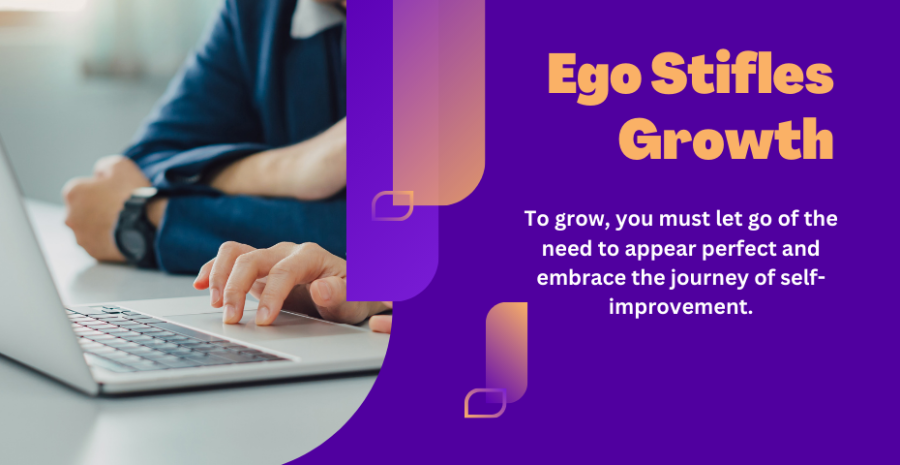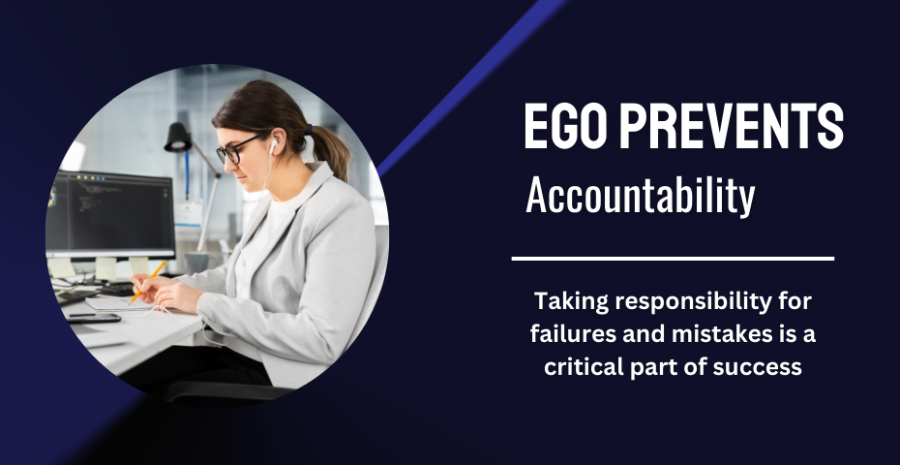
How Ego is Your Biggest Enemy: Understanding its Impact on Success

In the journey toward success, one often faces numerous external obstacles such as competition, market volatility, and unforeseen circumstances. However, one of the most dangerous and insidious obstacles comes from within: the ego.
Ego is the silent saboteur that creeps into our mindset, distorts our vision, and skews our perception of reality. It convinces us of our superiority, blinds us to constructive criticism, and discourages us from collaboration, all while feeding our need for validation and admiration.
Often, the most significant barrier to personal and professional growth is not the external world but the internal battle between our ego and our true selves. Ego, when unchecked, leads to arrogance, resistance to change, and an inability to learn from others.
While confidence is vital to success, ego takes it a step further, making us believe that we know it all and that others' opinions are inferior. The result is a stagnation of progress. Successful individuals, from entrepreneurs to athletes, have often attributed their failures not to lack of skill or opportunities but to the grip that their ego had over them.
To truly succeed, we must learn to recognize when ego is holding us back, strip it of its power, and humbly embrace learning, growth, and collaboration.
Ego is often misunderstood. It is not simply the act of boasting or seeking attention. Instead, it is a deeper, more profound sense of self-importance that distorts reality. It whispers in your ear that you are better than others and that you don’t need help.
It is the enemy because it hinders your ability to see the world clearly, to take necessary risks, and to accept failure as part of the growth process.
In this blog, we will explore 10 key ways in which ego can become the biggest enemy on your path to success. Each of these points delves into how ego manifests in your daily life and how, if left unchecked, it can cripple your personal and professional development.

At its core, success requires constant learning. The world is continuously evolving, and those who fail to keep up are left behind. Ego, however, convinces you that you already know everything you need to succeed.
It whispers that there’s no need to seek new information, learn from others, or admit ignorance. When ego drives your thinking, you become resistant to new ideas, feedback, and constructive criticism. This stagnation in learning can lead to poor decision-making, outdated practices, and eventually, failure.
True growth comes from recognizing that there is always something more to learn and humbly accepting that no matter how much you know, you can always improve. To succeed, you must silence your ego and open your mind to continuous learning.

Ego often manifests as arrogance—an inflated sense of self-worth that blinds you to the value others bring to the table. Arrogance prevents you from listening to others' opinions, believing that you are always right. This mindset leads to isolation and missed opportunities.
When you assume you are always the smartest person in the room, you disregard potentially game-changing ideas or solutions from others. Arrogance also alienates people, making it difficult to build strong professional networks, which are often key to success.
A humble and open-minded approach fosters collaboration, learning, and better decision-making, leading to more sustainable success.

Whether in business or personal life, relationships are crucial to success. Ego-driven individuals often prioritize their own needs, desires, and opinions over others, leading to strained or broken relationships. Collaboration and teamwork suffer when one person believes they are above everyone else.
Ego can cause misunderstandings, poor communication, and conflict, making it challenging to maintain healthy, productive relationships.
By putting ego aside, you can develop deeper, more meaningful connections with others, which fosters trust, loyalty, and support—cornerstones of both personal happiness and professional success.

Growth, whether personal or professional, requires acknowledging areas of weakness and actively working to improve them. However, ego prevents this self-reflection.
When ego dominates, it convinces you that admitting flaws or mistakes is a sign of weakness, and as a result, you avoid confronting areas where improvement is needed. This stunts growth and prevents you from reaching your full potential.
Successful individuals recognize that growth is a continuous process of learning from failures, receiving feedback, and making necessary changes.
To grow, you must let go of the need to appear perfect and embrace the journey of self-improvement.

Ego craves immediate validation and recognition, which often leads to short-term thinking. Rather than focusing on long-term goals, ego-driven individuals seek quick wins that boost their self-esteem.
This shortsightedness can result in decisions that are not aligned with sustainable success.
Whether it’s cutting corners, making impulsive choices, or focusing on personal glory over team achievements, the ego-driven quest for immediate rewards can derail long-term progress.
Success requires patience, discipline, and the ability to see the bigger picture. Overcoming ego allows you to focus on long-term goals rather than the fleeting satisfaction of short-term gains.

Taking responsibility for failures and mistakes is a critical part of success. However, ego avoids accountability at all costs.
When ego is in control, you deflect blame onto others, make excuses, or downplay your role in failure. This lack of accountability prevents you from learning valuable lessons and making necessary changes to avoid future mistakes.
True success comes from owning your actions, learning from them, and improving. Accountability is empowering, as it puts you in control of your success.
By shedding ego, you can accept responsibility and take the necessary steps to grow and improve.

Ego clouds judgment. It makes you believe that your perspective is the only valid one and that others' input is irrelevant. This tunnel vision can lead to poor decision-making, as you fail to consider all available options, perspectives, and consequences.
Ego-driven decisions are often based on the desire for personal validation or recognition rather than what is best for the situation or organization.
Successful decision-making requires humility, open-mindedness, and the ability to consider a variety of viewpoints. By removing ego from the equation, you can make more balanced and effective decisions.

Success often requires taking calculated risks. However, ego inhibits this process by fostering a fear of failure. Ego-driven individuals are more concerned with preserving their image and avoiding embarrassment than with taking the necessary risks for growth.
This fear of failure leads to missed opportunities and stagnation. When you let go of ego, you become more willing to step outside your comfort zone, embrace uncertainty, and take risks that can lead to significant rewards.
Risk-taking is an essential part of success, and overcoming ego is the first step toward embracing it.

A fixed mindset—the belief that your abilities are static and unchangeable—is a product of ego. Ego convinces you that admitting mistakes or failures is a sign of weakness, leading you to avoid challenges that could expose your limitations.
This mindset stifles growth, as it prevents you from embracing challenges, learning from failures, and developing new skills.
A growth mindset, on the other hand, acknowledges that success is a result of effort, learning, and persistence. To cultivate a growth mindset, you must first overcome ego and recognize that failure is a part of the learning process.

Ego often leads to isolation. When you prioritize your own importance over others, you alienate those around you. This isolation can result in a lack of support, feedback, and collaboration, all of which are essential to success.
Successful people understand the value of community, mentorship, and teamwork. By setting aside ego, you open yourself up to building meaningful relationships, receiving guidance, and collaborating with others.
These connections are often the key to overcoming obstacles and achieving long-term success.
Ego is the invisible barrier that stands between you and your full potential. It is the voice that tells you to prioritize your pride over progress, to reject help, and to cling to outdated beliefs rather than embracing growth. To succeed, you must learn to quiet that voice.
The most successful individuals are those who can step outside their egos and see the bigger picture. They recognize that success is not just about individual achievements but about collaboration, continuous learning, and humility.
By taming your ego, you free yourself to take risks, learn from mistakes, and build strong, meaningful relationships that will propel you toward your goals.
The path to success is not about proving your superiority, but about constant self-improvement, learning, and evolving. Letting go of ego is the first step on that path.
.png)
About: Andries vanTonder (65)
Over 45 years selfemployed
He is a Serial Entrepreneur, an Enthusiastic supporter of Blockchain Technology and a Cryptocurrency Investor
Find me: Markethive Profile Page | My Twitter Account | My Instagram Acount | and my Facebook Profile.
